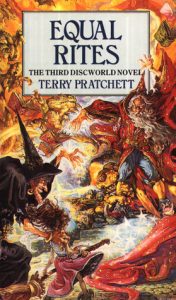Equal Rites by Terry Pratchett
 The third Discworld novel waves farewell to Rincewind and Twoflower, and introduces us instead to one of the most popular recurring characters of the series: Granny Weatherwax. Granny is a witch, dwells in a remote mountain village named Bad Ass, and is an expert in the field of headology; she is allergic to cats, despises ‘jommetry’, and is wary of people originating from ‘forn parts’. Granny raises goats, grows mysterious herbs, and can inhabit, or ‘borrow’, the minds of animals. She can stare down the toughest of men, engage in shapeshifting duels, cure sick people and deliver babies; but when suddenly faced with a curious little girl who is much more than she seems, Granny is at a bit of a loss.
The third Discworld novel waves farewell to Rincewind and Twoflower, and introduces us instead to one of the most popular recurring characters of the series: Granny Weatherwax. Granny is a witch, dwells in a remote mountain village named Bad Ass, and is an expert in the field of headology; she is allergic to cats, despises ‘jommetry’, and is wary of people originating from ‘forn parts’. Granny raises goats, grows mysterious herbs, and can inhabit, or ‘borrow’, the minds of animals. She can stare down the toughest of men, engage in shapeshifting duels, cure sick people and deliver babies; but when suddenly faced with a curious little girl who is much more than she seems, Granny is at a bit of a loss.
Esk is the eighth child of an eighth son, and, due to a mix-up when she was born, has inherited a staff of power formerly belonging to a wizard. When she begins to show signs of magic, Granny Weatherwax takes it upon herself to train Esk in the ways of Witchcraft (herb-growing, medicine making, distilling alcohol, cleaning the kitchen table); but she soon comes to realise that Esk was never meant to be a witch. No, her power is a Wizard’s power, and the only way she can learn how to control it is by travelling to the Unseen University to train amongst wizards. And this is a problem, because there has never been a female wizard in the history of the Discworld: it’s against the lore.
The novel follows Esk’s eventful journey to Ankh-Morpork and fraught introduction to the Unseen University. However, while the story is ostensibly about Esk, the majority of page time is given over to Granny, one of my favourite characters of the Discworld series. It’s full of comic moments, such as when Granny falls into a bear pit whilst trying to jump-start her broomstick; and in some ways Equal Rites is more about the journey of a very old woman learning lots of new things about a world she’s never really visited. As Granny would say derisively, ‘most people have never set foot outside their own head’, and we come to realise that this actually also applies to Granny herself.
Equal Rites is short, light and a lot of fun. The pacing isn’t rushed, but nor does it meander too much, and while it lingers a little on Esk’s first forays into magic this feels necessary for the development of both Esk and Granny’s characters. One thing I will say – something I feel applies to many of Pratchett’s books – is that he’s great at beginning stories, but I sometimes get the sense he doesn’t always know how he plans on ending them. The beginnings of most of his books are excellent, but as he’s dragging us along through the twists and turns it can feel as though he’s inventing the plot as he goes along. That’s the case here with Equal Rites, or so it seems to me.
That said, it’s a nice refreshing read, and would be a great starting point for those unfamiliar with the series.
